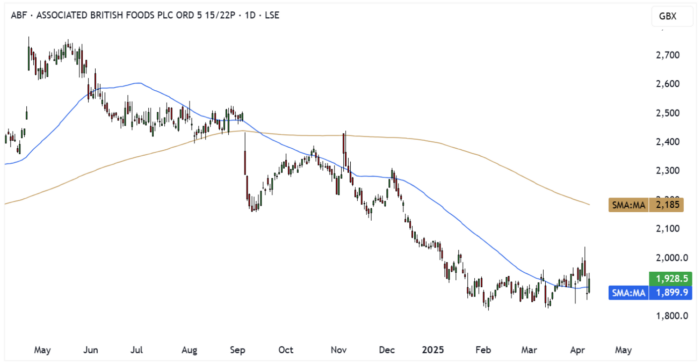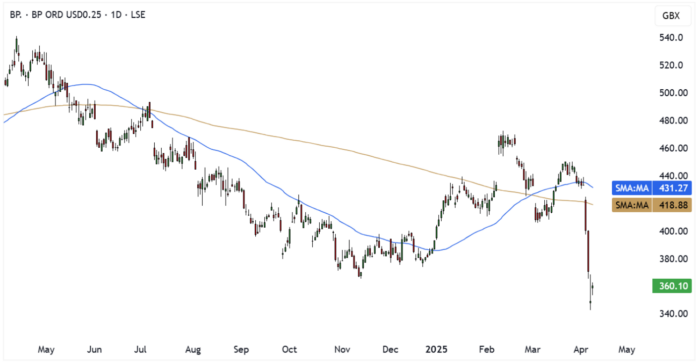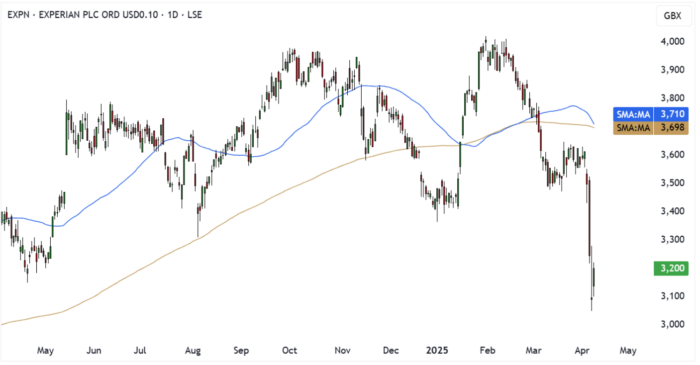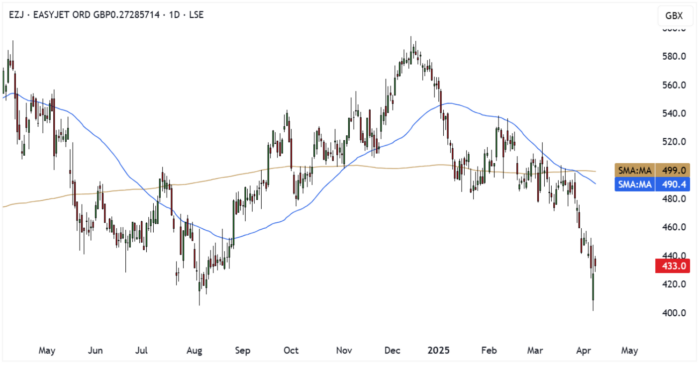9th Apr 2025. 9.04am

Regency View:
Update:

Regency View:
Update:
Market View: Navigating global uncertainty while staying the course in UK equities
The life of a long-term investor is tough. We can spend months researching companies, building diversified portfolios, and carefully managing risk — only for an orange-faced president in a foreign country to tear up the rulebook overnight. Apologies for being too political — let’s get back to neutral territory.
The key point is this: long-term resilience is essential. Systemic market sell-offs can create genuine opportunity for those who are nimble and aware enough to respond when others freeze.
Here’s what we know so far. Risk premiums have gone up. Whether or not Trump walks back his trade surplus crusade, the damage is already done. Whatever credibility he had — if any — has been severely dented. The mere threat of this type of sweeping, bilateral economic policy is enough to derail investment decisions and inject real fear into global markets.
That fear is starting to ripple through the system. The heightened uncertainty will reduce investment, weigh on sentiment, and likely continue to hurt sectors most exposed to global growth — think commodities, industrials, and China-proxy currencies like the Aussie dollar.
But let’s also be clear: this isn’t a global financial crisis. It’s not a pandemic. We’re not plunging into the unknown in the same way. The downside, though, is that governments have far less room — both politically and fiscally — to step in with big, bold stimulus.
In this environment, quality matters more than ever. That’s why we stick to companies with strong balance sheets, high returns on capital, and resilient cash flows. These are the kinds of businesses that can weather policy shocks, geopolitical drama, and short-term macro headwinds — and still come out stronger on the other side.
This is what long-term investing looks like. It’s not always easy. But moments like this — when markets wobble and narratives break down — can be exactly when the best opportunities emerge.
Primark CEO steps down following behavioural misconduct allegation
Paul Marchant has resigned with immediate effect from his role as Chief Executive of Primark following an allegation about his behaviour towards an individual in a social setting. The allegation prompted an investigation led by external lawyers on behalf of Associated British Foods (ABF), Primark’s parent company. Marchant cooperated with the process, admitted to an error of judgement, and issued an apology to the individual involved, as well as to colleagues and the ABF Board.
In response to the leadership gap, ABF’s Group Finance Director, Eoin Tonge, has been appointed interim Chief Executive of Primark. Joana Edwards, currently the Group Financial Controller, will step in as interim Group Finance Director. Both are described by the company as highly capable, and ABF has reaffirmed its commitment to upholding high standards across its businesses.

ABF expressed disappointment over the incident and reiterated its commitment to maintaining a safe, respectful, and inclusive working environment. Group CEO George Weston emphasised the importance of integrity and respectful conduct, stating that the company’s culture must be larger than any one individual. The Group will continue to support the individual who raised the concern and confirmed it will publish its interim results as planned on 29 April 2025.
BP slips as oil breaks lower on supply surge and demand fears
BP’s (BP.) share price has come under pressure, falling back toward its March lows as oil prices extend their decline. While broader market sentiment remains fragile, the direct driver here is crude — and the sharp drop in Brent following last week’s surprise breakdown through long-term support.
OPEC+ tried to steady the ship with a call for compliance, but markets are clearly more focused on the unexpected increase in supply and the growing threat to global demand. BP’s earnings are tightly leveraged to oil prices, and with Brent down nearly 11% last week and trading below $65, it’s no surprise to see the shares slipping.

Technically, the stock is now sitting just above key short-term support. If oil continues to unwind, there’s a risk BP shares could re-test the December lows, but much will depend on whether this is a short-term flush or the start of a more protracted leg lower for crude.
Experian finalises ClearSale acquisition in Brazil
Experian (EXPN) has completed its acquisition of ClearSale S.A., Brazil’s leading digital fraud prevention company. The deal, first announced in October 2024, has now cleared all regulatory and transactional conditions. As a result, ClearSale will be formally delisted from the Brazilian Stock Exchange (B3) and deregistered from the country’s securities regulator, CVM, with all final documentation expected to be processed over the coming weeks.
ClearSale’s last day of trading on B3 was 1 April 2025, marking the final step before it transitions fully under Experian’s ownership. The delisting from B3 is expected to be confirmed within five business days of the formal request, while deregistration with CVM is due around 30 business days after submission. This move strengthens Experian’s presence in the Latin American market, particularly in the fast-growing field of digital fraud prevention.

To support the acquisition, Experian has established a sponsored Level 1 Brazilian Depositary Receipt (BDR) programme. The BDRs, which represent ordinary shares in Experian plc, will be listed on B3 under the name EXPERIAN PLC and the code EXPB31. Trading is expected to begin on 4 April 2025. While the BDRs will not carry voting rights, they offer Brazilian investors easier access to Experian shares.
easyJet eyes strong summer as Luton expansion approved
easyJet (EZJ) is reporting positive momentum in bookings ahead of the summer season, despite a slower March due to the late timing of Easter. CEO Kenton Jarvis said demand for flights in the current April to June quarter is running ahead of last year, with early signs also encouraging for the peak summer months. While only a small portion of July to September bookings are in so far, Jarvis noted this was normal for the time of year. He added that easyJet is seeing growing interest in longer European flights and destinations in North Africa, and may benefit if transatlantic travel demand dips.
The airline appears unfazed for now by upcoming UK plans to introduce an Electronic Travel Authorisation (ETA) requirement for European visitors, though Jarvis said he would have preferred to see the fee scrapped altogether. This comes as Virgin Atlantic, partly owned by Delta and Richard Branson, flagged slowing U.S.-UK travel demand due to economic uncertainty across the Atlantic — a concern not currently echoed by easyJet.

In a separate boost for the airline, the UK government has approved a major expansion of London Luton Airport, one of easyJet’s key bases. The development includes a new terminal and supporting infrastructure, increasing capacity from 18 million to 32 million passengers annually by 2043. Although planning officials had advised against the project due to environmental concerns, Transport Secretary Heidi Alexander approved it, citing the “compelling case” for growth. The expansion is expected to generate up to 11,000 jobs and add £1.5 billion a year to the UK economy.
Disclaimer:
All content is provided for general information only and should not be construed as any form of advice or personal recommendation. The provision of this content is not regulated by the Financial Conduct Authority.




